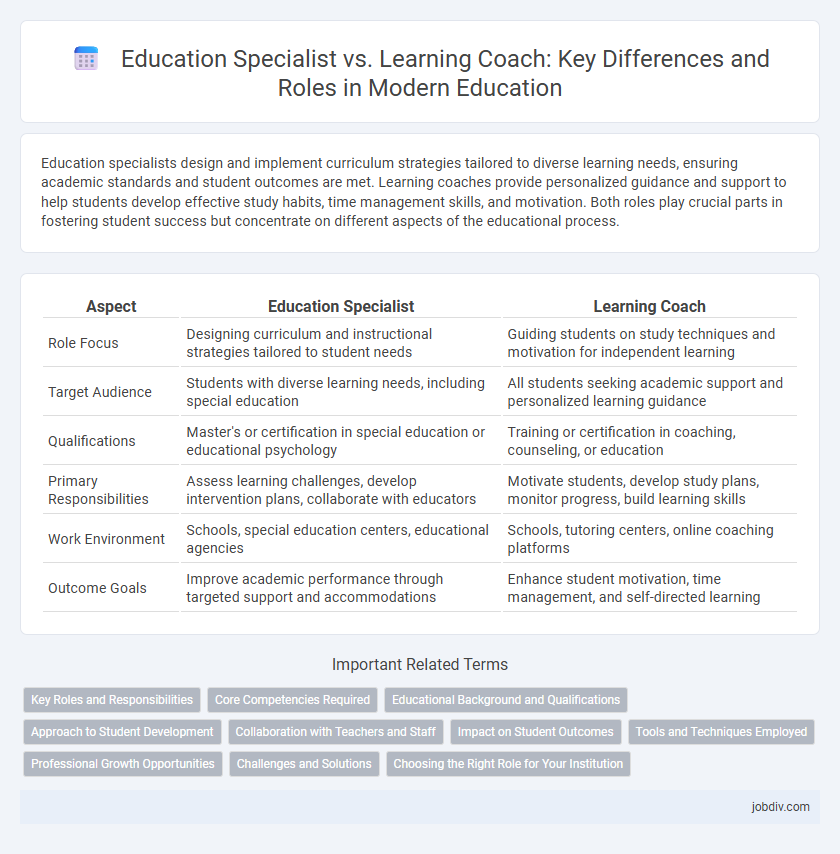Education specialists design and implement curriculum strategies tailored to diverse learning needs, ensuring academic standards and student outcomes are met. Learning coaches provide personalized guidance and support to help students develop effective study habits, time management skills, and motivation. Both roles play crucial parts in fostering student success but concentrate on different aspects of the educational process.
Table of Comparison
| Aspect | Education Specialist | Learning Coach |
|---|---|---|
| Role Focus | Designing curriculum and instructional strategies tailored to student needs | Guiding students on study techniques and motivation for independent learning |
| Target Audience | Students with diverse learning needs, including special education | All students seeking academic support and personalized learning guidance |
| Qualifications | Master's or certification in special education or educational psychology | Training or certification in coaching, counseling, or education |
| Primary Responsibilities | Assess learning challenges, develop intervention plans, collaborate with educators | Motivate students, develop study plans, monitor progress, build learning skills |
| Work Environment | Schools, special education centers, educational agencies | Schools, tutoring centers, online coaching platforms |
| Outcome Goals | Improve academic performance through targeted support and accommodations | Enhance student motivation, time management, and self-directed learning |
Key Roles and Responsibilities
Education Specialists design curriculum frameworks and assess educational programs to enhance student learning outcomes through data-driven strategies. Learning Coaches provide personalized guidance and support to students, focusing on motivation, study skills, and goal-setting to improve academic performance. Both roles collaborate with educators but differ in that Education Specialists focus on systemic improvements while Learning Coaches address individual learner needs.
Core Competencies Required
Education Specialists must demonstrate expertise in curriculum development, assessment design, and data analysis, ensuring instructional strategies align with educational standards and learner needs. Learning Coaches excel in personalized support, motivational techniques, and goal-setting strategies to foster student engagement and self-directed learning. Both roles require strong communication skills, but Education Specialists often emphasize technical proficiency while Learning Coaches prioritize emotional intelligence and adaptability.
Educational Background and Qualifications
Education Specialists typically hold advanced degrees such as a master's or doctorate in Education, Special Education, or Curriculum Development, paired with certifications in specialized instructional strategies. Learning Coaches often possess a background in psychology, counseling, or education, with qualifications that include coaching certifications or training in motivational techniques and personalized learning plans. Both roles emphasize expertise in educational theory, but Education Specialists focus more on curriculum design and assessment, while Learning Coaches prioritize student motivation and goal-setting methods.
Approach to Student Development
Education Specialists emphasize tailored interventions based on diagnostic assessments to address specific student needs, often collaborating with educators and families for individualized support plans. Learning Coaches focus on fostering self-directed learning skills and motivation, guiding students to develop strategies for academic success and personal growth. Both roles aim to enhance student development but differ in methodology, with Education Specialists adopting a clinical approach and Learning Coaches emphasizing empowerment and independence.
Collaboration with Teachers and Staff
Education specialists collaborate closely with teachers and staff to design tailored interventions that address student learning challenges and promote academic success. Learning coaches work alongside educators to integrate personalized coaching strategies, offering real-time feedback and support to enhance instructional methods. Both roles emphasize teamwork to create a cohesive learning environment that meets diverse student needs.
Impact on Student Outcomes
Education specialists design tailored intervention strategies based on data-driven assessments to address specific learning challenges, significantly improving student outcomes in academic achievement and social-emotional development. Learning coaches provide personalized guidance and motivation, fostering self-regulated learning and critical thinking skills that empower students to take ownership of their education. Both roles contribute uniquely to enhancing student performance, with education specialists focusing on targeted support and learning coaches emphasizing skill-building and learner autonomy.
Tools and Techniques Employed
Education specialists employ data-driven assessment tools and individualized curriculum design software to tailor learning experiences, while learning coaches utilize motivational interviewing techniques and goal-setting frameworks to enhance student engagement and self-regulation. Education specialists integrate formative and summative evaluation methods to measure learning outcomes, whereas learning coaches leverage cognitive behavioral strategies and personalized feedback mechanisms to foster growth mindsets. Both roles incorporate technology, but education specialists emphasize instructional design platforms, and learning coaches prioritize interactive digital applications that support skill development and emotional resilience.
Professional Growth Opportunities
Education Specialists often engage in advanced certification programs and leadership workshops to enhance instructional skills and curriculum design expertise. Learning Coaches pursue opportunities in mentorship, personalized learning strategies, and technology integration to support diverse learner needs effectively. Both roles benefit from continuous professional development platforms that foster collaboration, innovation, and educational research participation.
Challenges and Solutions
Education specialists often face challenges in curriculum development and aligning instructional strategies with diverse student needs, requiring data-driven assessment solutions and continuous professional training. Learning coaches encounter difficulties in personalized learner engagement and motivation, which can be addressed through adaptive technologies and individualized support plans. Both roles benefit from collaborative frameworks that foster communication between educators, learners, and stakeholders to enhance educational outcomes effectively.
Choosing the Right Role for Your Institution
Education Specialists focus on curriculum design, assessment strategies, and policy implementation to improve institutional academic outcomes. Learning Coaches personalize student support by fostering skills such as time management, goal setting, and self-motivation to enhance learner engagement and performance. Selecting the right role depends on your institution's priorities--choose Education Specialists for systemic instructional improvements and Learning Coaches to boost individual student success.
Education Specialist vs Learning Coach Infographic

 jobdiv.com
jobdiv.com